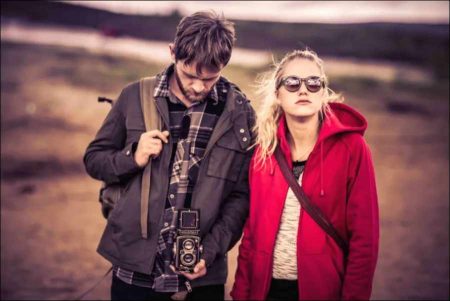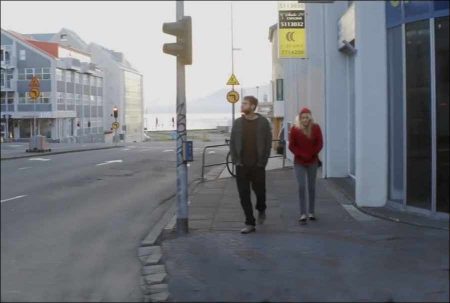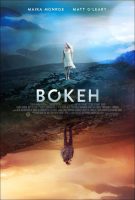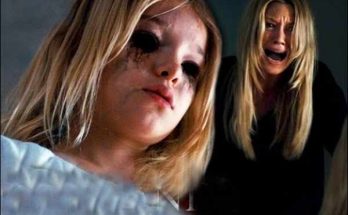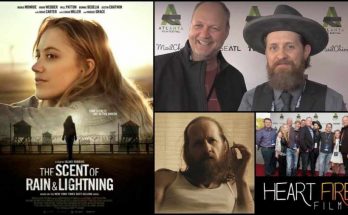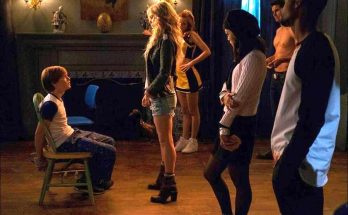Bokeh, a science fiction drama, stars Maika Monroe and Matt O’Leary. Shot entirely in Iceland, this meditative, delicate fable is about the values of life and living.
On a romantic getaway to Iceland, a young American couple wake up one morning to discover every person on earth has disappeared. Their struggle to survive and to reconcile the mysterious event lead them to reconsider everything they know about themselves and the world.
The couple in this story are forced to think about the brevity of life on the planet and thus have a harder time making better choices. The story balances the universal theme of love while displaying the loneliness that exists with being in love.
Bokeh is the blur, the out of focus part of the photo. In life, we choose what we focus on and what we blur. Our film tells the story of two people who continue to change their priorities, their ideals, their focus based on their world disappearing. They are defined not just by what they focus on, but what they choose to blur.
Bokeh is a 2017 science fiction drama film written and directed by Geoffrey Orthwein and Andrew Sullivan. It stars Maika Monroe and Matt O’Leary as two American tourists in Iceland who find everyone else on the island has mysteriously vanished. It premiered at the Santa Barbara International Film Festival and was released theatrically in the United States on March 24, 2017.
Film Review for Bokeh
“Last people on Earth” movies are practically a genre in themselves, having begun as a reaction to 1950s atom-bomb anxiety (“On the Beach,” “Five”), then remained a sporadic presence in all subsequent waves of screen sci-fi, including environmental and zombie apocalypses. “Bokeh” belongs to the category’s least populist corner, in which the catastrophic event itself is not depicted and/or left entirely mysterious, with the focus on the few survivors. and how they manage — or fail — to carry on after civilization’s end.
Movies of this stripe (like “Glen and Randa,” “The Quiet Earth” or, more recently, “The Road”) are bound to frustrate those anticipating any conventional fantasy thrills, while instead aiming to provide the abstract rewards of a speculative mood piece. That’s likely to be the reaction to “Bokeh,” which takes its name from the photographic term for blurry parts of a picture produced by variable lens focus.
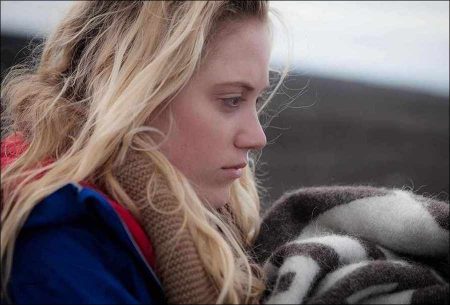
Why that title? You might as well ask why the central figures here wake up one day to find themselves seemingly the last people on Earth; no answer will be forthcoming from this first feature from Geoffrey Orthwein and Andrew Sullivan. Light on plot and explanation, while not perhaps so deep as it would like to think itself on a philosophical plane, this minimalist drama is bound to induce a parting “What was that about?” shrug from many viewers. Nonetheless, they’ll be held to a degree by the film’s concept, confident execution, and use of beautiful Icelandic locations.
Iceland is the place that young American couple Jenai (Maika Monroe) and Riley (Matt O’Leary) have chosen for their vacation, which is also her first time abroad. At first they behave like any other tourists, seeing the sights in town, eating out, going on guided walks, etc. But one morning after Jenai witnesses some odd lights in the sky during the night, they exit their hotel to find no one around… anywhere.
Cars have seemingly been abandoned in the streets; shops are unlocked but empty. At first they assume the populace has been drawn away by some holiday event, or an emergency evacuation. But then it turns out that even the folks back home aren’t answering their phones. TV stations have gone off air; the internet has remained stagnant since the prior evening. All human activity has apparently ceased, sans corpses or any other proof of disaster to explain it.
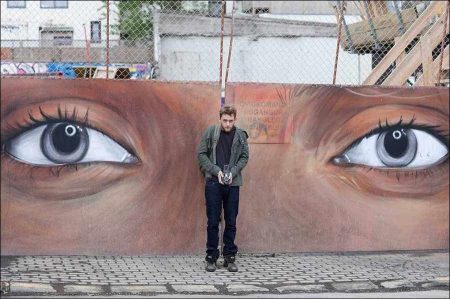
“At least we’re here together,” Riley says, and for a while they’re able to amuse themselves with hedonism and consumerism that no longer knows monetary bounds. (They’re spared immediate logistical hardships like failed electricity or heat, because Iceland’s energy systems are geothermal-powered — and while animal as well has human life seems gone, Mother Nature is otherwise carrying on as usual.) But Jenai longs for home and family. She can’t accept whatever has happened, or their own mysteriously survival, with no apparent purpose or meaning to it. (This will also be a likely issue for viewers.)
The co-directors’ screenplay is not high in incident, but it does move along briskly, taking advantage of picturesque settings inside and (increasingly) outside of Reykjavik, as our protagonists have a ready supply of vehicles, gas and time at their disposal. What the script does not do, rather oddly, is lend those protagonists much depth or personality, though the performers themselves are attractive and personable enough. Admittedly, the characters are still young. But surely they must have backgrounds, interests, and aspirations — none of which the film bothers to express. We never even glean how serious they’d be about each other if life still offered other prospects.
Not unlike Burgess Meredith in the famous “Twilight Zone” episode where a voracious reader finds he’s got “all the time in the world” and an open library after humanity likewise vanishes — only to break his reading glasses — here, we’re stuck for eternity with two perfectly decent people who, it seems, just aren’t very interesting company. Not even for each other.
It’s notable that when the duo finds it might not be alone, after all — something that would invariably spell terror in a different kind of movie — the discovery offers scant comfort. The more interesting existential debate this triggers represents a direction too briefly taken to really deepen “Bokeh,” which in any case soon trundles on toward a less-than-satisfying fadeout, with all narrative mysteries left dangling.
The result is a “What if?” exercise that ultimately doesn’t take its starting premise to any place that’s terribly interesting. However, for at least as long as it appears to be heading somewhere, “Bokeh” holds attention with polish and resourcefulness on a limited budget. Joe Lindsay’s widescreen photography makes the most of the striking landscapes on hand, Orthwein’s editorial pace is unhurried yet lively, while Keegan DeWitt’s solo-piano-based score strikes appropriately plaintive, spectral notes.
Bokeh (2017)
Directed by: Geoffrey Orthwein, Andrew Sullivan
Starring: Maika Monroe, Matt O’Leary, Arnar Jónsson, Gunnar Helgason, Berglind Rós Sigurdardóttir
Screenplay by: Geoffrey Orthwein, Andrew Sullivan
Production Design by: Roger C. Ambrose
Cinematography by: Joe Lindsay
Film Editing by: Geoffrey Orthwein
Costume Design by: Rachel Dagdagan
Makeup Department: Margaret Caragan
Music by: Keegan DeWitt
MPAA Rating: None.
Distributed by: Screen Media Films
Release Date: February 3, 2017 (SBIFF), March 24, 2017 (United States)
Views: 46
